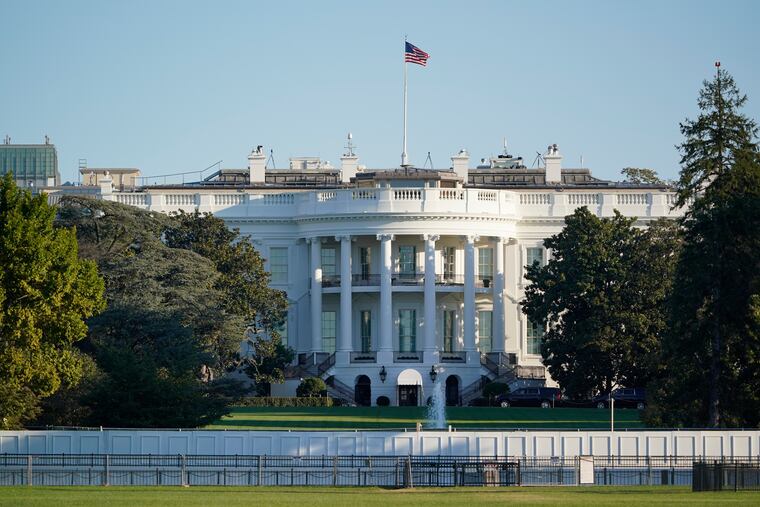Trump hospital stay due to coronavirus renews focus on transfer of power provisions
Trump's admission to a Washington-area military hospital raises the question of what would happen if his condition worsens significantly.

WASHINGTON — The White House said that President Donald Trump remains in charge of the U.S. government despite his coronavirus diagnosis, but his admission to a Washington-area military hospital raises the question of what would happen if his condition worsens significantly.
White House physician Sean Conley said on Saturday that he's "extremely happy" with the president's condition and that a "mild cough," nasal congestion and fatigue were "resolving and improving." But a person familiar with the matter said Trump's vital signs over the last 24 hours were very concerning and he isn't on a clear path to a full recovery yet.
There are provisions for a peaceful transfer of power if the president becomes incapacitated. The 25th Amendment, added to the Constitution in the wake of the assassination of John F. Kennedy, outlines what should happen if unable to carry out his duties, even if only temporarily.
A White House official said Friday when Trump was taken to Walter Reed National Military Hospital that there were no plans to transfer presidential authority to Vice President Mike Pence. White House press secretary Kayleigh McEnany said Trump would continue working while there "for the next few days."
It's not the first time a world leader has been hospitalized for COVID-19. In April, British Prime Minister Boris Johnson entered intensive care just a few days after announcing to the world that he had tested positive for the virus. After initially experiencing mild symptoms, his condition deteriorated rapidly and his doctors considered putting him on a ventilator before he recovered.
In the U.S., under Section 3 of the 25th Amendment, the president can voluntarily transfer power to the vice president by submitting a letter to the President pro tempore of the Senate and the Speaker of the House of Representatives. This provision has been used three times in the past when a president underwent general anesthesia for a medical procedure, according to the Congressional Research Service. Ronald Reagan used it informally in 1985 and George W. Bush used it in 2002 and 2007.
» READ MORE: President Trump said to be improving from COVID-19, next 48 hours ‘critical’
Although the amendment was intended to provide clear guidance, circumstances aren't always so clear.
When Reagan was on a gurney at George Washington Memorial Hospital in 1981 after being wounded in an attempted assassination, Chief of Staff James Baker and counselor Edwin Meese retreated to a janitor's closet to consider whether to temporarily transfer authority to Vice President George H.W. Bush, according to the book "Rawhide Down," by Del Quentin Wilber.
Reagan's advisers ultimately decided not to invoke the 25th Amendment as the president underwent emergency surgery. Yet his administration did draft several letters to the President Pro Tempore of the Senate Strom Thurmond of South Carolina and Speaker of the House Tip O'Neill, transferring power to Bush, who was on a plane headed to Washington at the time.
The letters were not sent.
» READ MORE: History is replete with secrecy and lies about presidents' health
If the president is not able to voluntarily transfer power or refuses to do so, the vice president and a majority of the Cabinet can essentially perform the same function by alerting the president pro tempore of the Senate and the House speaker. Under this scenario, which is provided for in Section 4 of the 25th Amendment, the vice president would also assume power.
If the president recovers, he or she would then send another letter to the same people saying he or she is ready to resume command. Under certain circumstances, the vice president and the cabinet could contest this notification, sending the whole matter to the Congress for consideration. If Congress decides by a two-thirds vote that the president is still incapacitated, the vice president remains the acting president.
John Hudak, a scholar at the Brookings Institution, recommended in July that those in the direct line of succession to the presidency, including Pence, House Speaker Nancy Pelosi, and President pro tempore of the Senate Chuck Grassley, an Iowa Republican, be isolated from the president, along with members of the Cabinet.
"It would be especially important to ensure that the vice president have limited contact with individuals generally to reduce his chances of contracting the virus as well," Hudak wrote.
Pence has tested negative for the virus, as has Pelosi.
If Trump undergoes treatments that limit his ability to perform the duties of the presidency, he could use the mechanism provided under Section 3 of the 25th amendment to temporarily transfer power to the vice president, Hudak wrote.